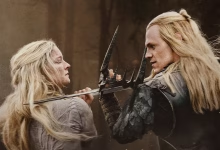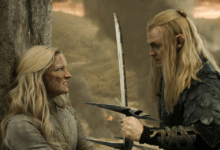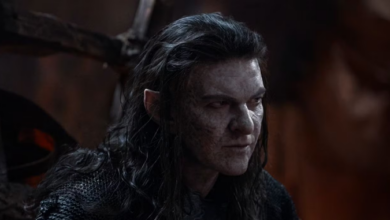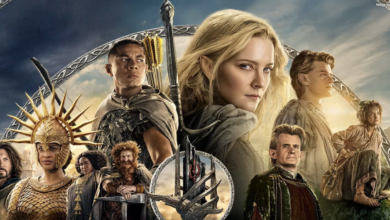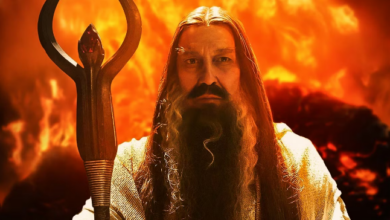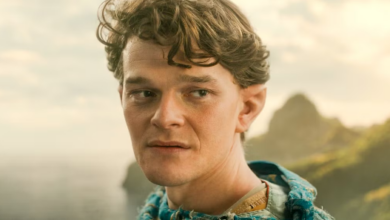‘The Rings of Power’ Season 2 Review: Amazon’s ‘Lord of the Rings’ Series Comes Into Its Own
J.D. Payne and Patrick McKay’s Amazon Prime Video prequel still stumbles from time to time over its fated plot points, but the second season finds a stronger foothold in character and sprints into a battle for the ages.
“The Lord of the Rings: The Rings of Power” Season 2 gets off on the wrong foot — or so it seems. Long before Sauron (Charlie Vickers) first meets Galadriel (Morfydd Clark) on that makeshift raft stranded in the ocean, he was in a dark castle pitching his leadership potential to an army of orcs. It doesn’t go well (a bummer, I know), which leaves Sauron to do what he does best: Lurk in the shadows, stockpile energy from passing rats, and slowly build himself back into a force to be reckoned with. It’s only then, as he’s on his way back to the orc army (presumably to secure their leadership by less diplomatic means), that he makes a curious choice. The notoriously single-minded monster (he wants one thing and one thing only, which is to rule Middle Earth) actually pivots away from his primary plan. At the invitation of a kind, elderly man, Sauron decides to travel with some fleeing villagers to destinations unknown.
OK, fine, mad villains are going to villain madly sometimes. But his behavior only gets weirder from there. Soon, he’s talking in platitudes about his past. He’s acting as if he’s caught in some sort of an existential quandary. It’s as if the future Dark Lord may have just needed a little talk therapy to get his life back on track. “I’ve done evil,” Sauron morosely tells the old man. “Find forgiveness,” the man replies. “You’re alive because you’ve chosen good.” “But what of tomorrow?” Sauron asks. “You have to choose it again,” the man says. “And the next day. And the next, until it becomes part of your nature.”
Needless to say, Sauron does not follow the good doctor’s advice. His nature has already been decided, but the very idea that it might not be — that the epitome of evil in “The Lord of the Rings” could simply choose not to be so mean — feels antithetical to the franchise as we’ve come to know it (onscreen, at least). There is evil in this world, and there is good. Such absolutes are as irrefutable as they are timeless, and seeing “The Rings of Power” dare to imply otherwise with its Big Bad is jarring… until you realize that’s not what Sauron’s flashbacks are about. They aren’t foreshadowing a complex character turn. They’re showcasing an evolving immorality as slippery as it is steadfast.
Sauron, as evidenced by his hidden identity throughout the first season, is a master manipulator, and his tools of deception are on full display throughout Season 2. Here, he’s deceiving an old man, but he’s also, once more, deceiving the audience. By tricking us, even for a moment, into thinking malevolence personified may still have a soul worth saving, Sauron provides the first in a series of lessons about the pervasive nature of evil; how it can spring up out of nowhere and latch onto your being; how it doesn’t always triumph in big, showy displays of power, but often in a slow creep through whatever narrow crannies and nudged-open doors it can find; how once its claws are embedded deep enough, there’s no way to reason them back out again. “The Rings of Power” Season 2 isn’t questioning whether evil exists; it’s warning us that it’s always out there — sometimes hiding, but often in plain sight.
I can hear your groans now: “Oh, great. Another political allegory. Just what I need in a show about magic elves slicing and dicing their way through dozens of vile, mumbling orcs.” Well, first of all, it’s not my fault every orc looks exactly like Mitch McConnell. But also, don’t worry. Anyone intent on shutting out the political chaos sweeping through American culture can see nothing but pure fantasy in Amazon Prime Video‘s “Lord of the Rings” series, if they so choose. There are plenty of laughs to be had, Tolkien easter eggs to be found, and an extraordinary battle to gawk over. (Really, it’s quite a feat, even after last season’s stunner.)
Season 2 revolves around the construction of the titular rings. Sauron has to do make them in secret, so it’s a good thing his opposition is busy elsewhere, scattered across Middle Earth. Nori (Markella Kavenagh) and The Stranger (Daniel Weyman) are off trying to sort out his mysterious powers and less-mysterious past. The humans — namely, Queen Míriel (Cynthia Addai-Robinson), her usurper Pharazôn (Trystan Gravelle), and her loyal captain Elendil (Lloyd Owen) — can’t stop squabbling amongst themselves. The elves are similarly divided, although not for lack of communication. Galadriel is on the outs after failing to identify Sauron sooner, while High King Gil-galad (Benjamin Walker) and Elrond (Robert Aramayo) can’t agree on the best way to protect their people without endangering others.
Various members of these parties pop up here and there (Maxim Baldry’s Isildur is trying to find his way home, while Ismael Cruz Córdova’s Arondir is adrift — and underutilized — with no home to return to), but the sturdiest, strongest arc again belongs to the sturdiest, strongest characters. Though the dwarves are absent from the entirety of the premiere (a sign of things to come, as the series’ sprawling story structure ends up omitting at least one prominent character group from each episode), Prince Durin (Owain Arthur), Disa (Sophia Nomvete), and their king (Peter Mullan) are still in a tiff at the start of Season 2, one which mellows and then intensifies as their mountain home’s security comes into question.
There’s a distinct personality to the dwarves — a natural charm, yes, but also an amiable and proud spirit of community — that makes them an excellent fulcrum for “The Rings of Power.” Whenever another arc feels too slow or generic, circling back to the dwarves’ personal yet pivotal plot jolts the series to life, and it feels like showrunners J.D. Payne and Patrick McKay know it, lean into it, and get the most out of our hairy little miners. As the mountain goes, so goes Middle Earth (which isn’t a Tolkien quote, as far as I know, but perhaps it should be).
A better grasp of characters can be seen outside Khazad-dûm, as well, which is critical to overcoming “The Rings of Power’s” inherent prequel problems. (If we know what’s going to happen eventually, then we can’t simply be waiting around to see it happen. We have to be invested in the people caught up in what’s happening, much like we were in the modern standard for prequel series, “Better Call Saul.”) Not everyone leaps off the screen — the world of men is particularly dull, and The Stranger’s story often grinds momentum to a standstill — and a few nuanced emotional beats could’ve been portrayed with richer specificity.
But “The Rings of Power” does take advantage of TV‘s mightiest weapon for building empathy, interest, and overall investment: time. Celebrimbor (Charles Edwards) goes from a bit of a twit to a tragic figure representing so much of what Season 2 has to say. Galadriel, while with less screen time this season, becomes an even more compelling lead by the end, in no small part because of her flaws. For Durin, “prince” is too meager a title, and even Sauron, whose need to be both an emblem of evil and a fallible flesh-and-blood figure is the series’ trickiest tightrope to walk, gets to develop without betraying his infleixible inner nature.
And for anyone whose mind is bound to wander when every episode is longer than an hour (and not every story arc is as compelling as the dwarves’), “The Rings of Power” Season 2 actually feels like it’s about something (or, like Season 1, about more than recreating the movie trilogy). It’s about the hierarchy of evil and how one level can feed the other. It’s about finding forgiveness where you can, and not where you can’t. It’s about deciding to do what’s right, over and over, and all the unexpected obstacles that can complicate a choice that should come as naturally to everyone as picking out a donut.
Yes, “Lord of the Rings” has always been about these things in one way or another, but what matters is that “The Rings of Power” chooses to focus on certain details, rather than settling for capturing Tolkien’s broad sentimentality. It may seem like “The Rings of Power” begins badly — and again, it only seems that way — but there’s no mistaking it ends well. Here’s hoping we can say the same thing when we look back on 2024.
